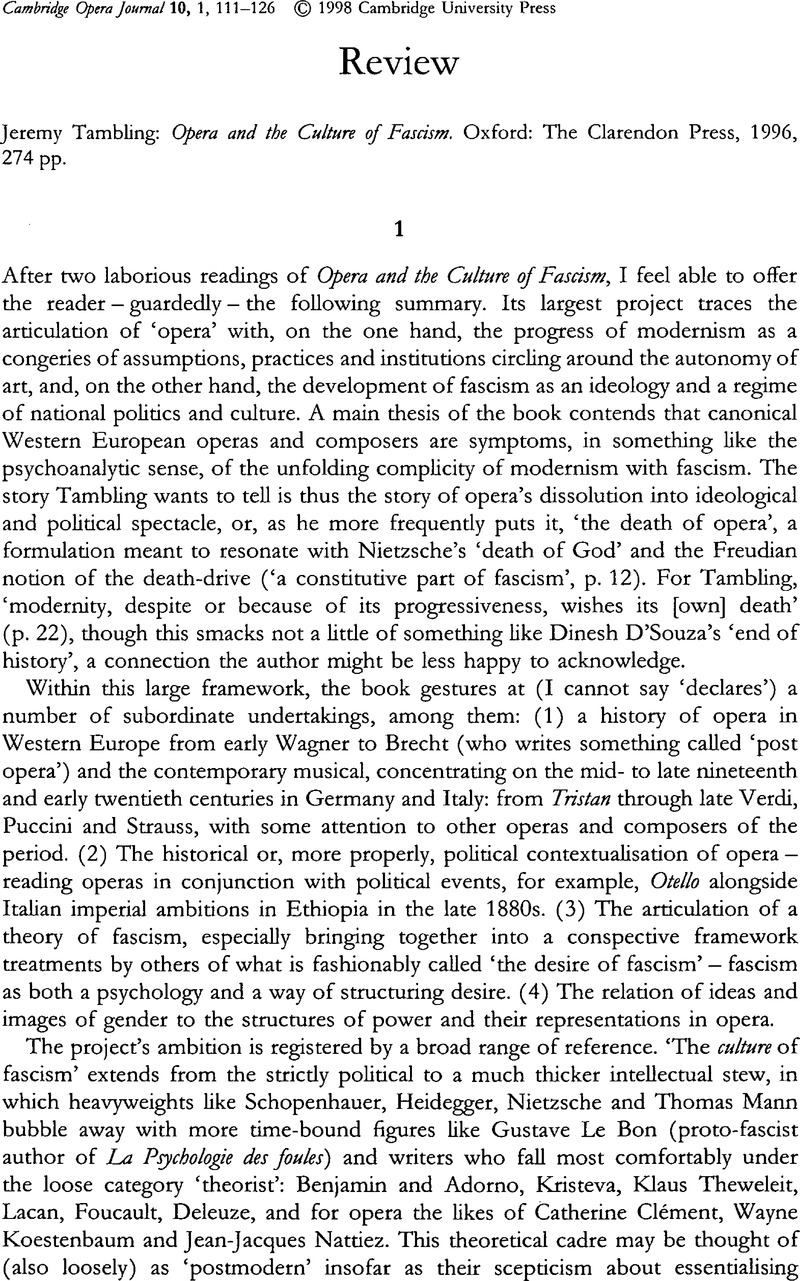No CrossRef data available.
Article contents
Jeremy Tambling: Opera and the Culture of Fascism. Oxford: The Clarendon Press, 1996, 274 pp.
Published online by Cambridge University Press: 27 August 2008
Abstract

- Type
- Review
- Information
- Copyright
- Copyright © Cambridge University Press 1998
References
1 See also the analysis of the opera and its heroine in terms of the poster advertising the first performance, pp. 120–1, which concludes that though ‘the poster is not Puccini's work’ it suggests ‘the power of contemporary discourses’ to construct meanings for the opera and even ‘the Puccini created by the discourse that creates this poster’.Google Scholar
2 Notice how the historical events are used rhetorically to render the ‘active questioning process’ unlikely - if all those Italians couldn't manage to stop doing what we know they were doing when they watched Turandot, how can any unsituated modern he or she be expected to escape?Google Scholar
3 See my ‘Opera and the Film Text: Four Readings of Carmen’, this journal, 6 (1994), 245–82.Google Scholar
4 This use of the term is associated with Derrida: ‘Signature, Event, Context’, and ‘limited, Inc.’Google Scholar
5 Ecrits, A Selection (New York, 1977), 155.Google Scholar
6 Tambling does not define or discuss the desiring component of critical nihilism, what it is that might make someone want to pursue dissemination, except in vague or cryptic formulations such as modernism desiring its own death. The ‘death-drive’ is always negatively toned for Tambling, apparently because it is always taken as literally about death, rather than in a more Nietzschean or Lacanian manner as a way of talking about the undoing and passing of old meanings to make way for new ones.Google Scholar
7 ‘Opera’ as a generic term is of course another such metonymy.Google Scholar
8 Especially in the early parts of the book, the rambling, associative and accretive textuality this way of proceeding creates often requires Tambling himself to point out retrospectively what he takes the point of the text he has just produced to have been.Google Scholar
9 In fact, the textual impasto from which this kind of reading can be abstracted, the collocation of texts and readings the book produces, depends on a continual evasion or obfuscation of causal relations, preempting consideration of the problem, however it might be decided in any particular case, by the uses of expressions like ‘the energies here recall’, something ‘fits with’ an aspect of facism, or ‘makes for an argument’ that ‘could align’ something with facism, ‘can be mapped on to’ it, or ‘suggests’ some relation with it, and so on, and on. This practice is joined with an equally maddening one of writing sentences whose subjects are pronouns without prior reference (Lacan does this all the time, but I trust Lacan), and the use of footnotes, later passages, and sometimes subordinate clauses in the same sentence, to undermine or eradicate a stated meaning on the general principle, ‘or perhaps just the opposite’.Google Scholar
10 Of Nietzsche's texts, Tambling makes extensive use at various points of The Case of Wagner, ‘Richard Wagner at Bayreuth’, The Gay Science and The Will to Power. He might have been better served by more attention to texts that foreground the question of the motives of the historiographer: The Genealogy of Morals, and especially the Untimely Meditation ‘The Use and Abuse of History for Life’.Google Scholar
11 If history is to be used to contain and specify the discursive extensions generated by textuality, it might be as well to remember what real historical fascists really did. If the reader wishes to see the present academic exercise as a cloak for my own desire to rip out the lungs of a man who bored and frustrated me for a very long time over things I care about, she is free to do so. 1 might point out, though, that I haven't broken Tambling's windows or sent him to a concentration camp, and, as far as I know, he hasn't done those things to anyone either.Google Scholar
12 I am perhaps irresponsibly (that is, appropriatively) inclined to read Madama Butterfly as a representation by Puccini of an opera within the opera of just this sort, an opera whose composer and director is that past mistress of the appropriation of cultural forms, European and Japanese - which she mingles in a hybrid local culture deployed in the interests of passive-aggression - Cio-Cio-San.Google Scholar
13 One would also want to see what possibilities for reading the biographical archive such a hypothesis opened up.Google Scholar




